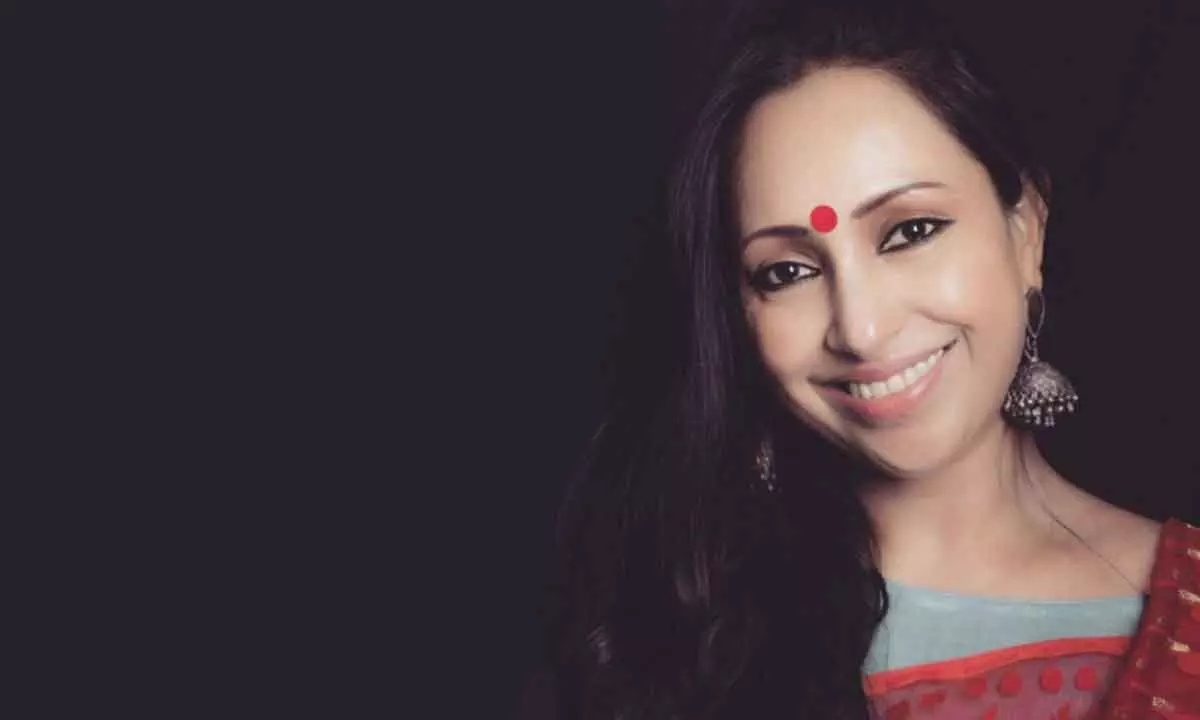Live
- Advocates Protest Misleading Land Allocation for Jogulamba Gadwal District Court Complex
- Good Swimmer, Lifejacket On’: Brother of Missing Man Holds Hope After Mumbai Boat Accident
- TTD Invites Proposals for 'Tirumala Vision-2047' Development Plan
- Champions Trophy 2025 Venue Revealed: India, BCCI Face Setback After ICC 'Compromise' Decision
- Apple vs. Meta: Privacy vs. Interoperability Under the EU’s Digital Markets Act
- District Collector Urges Swift Completion of Pending Construction Projects
- KTR Faces Case Over Rs 45-Crore Payment for Formula E Race in Hyderabad
- HYDRAA Demolishes Illegal Shops in Manikonda’s Alkapur Colony Amid Protests
- Why Dates Are a Winter Superfood: Top Health Benefits of Khajoor
- District Judge Ganta Kavitha Devi Conducts Surprise Inspection at Gadwal Government School
Just In
'Nautanki Saala and Other Stories' came from real life: Mohua Chinappa


Mohua Chinappa
Mohua Chinappa, popular from ‘The Mohua Show’ comes with her debut book which portrays real life character which she faced from her childhood
Mohua Chinappa, who is well-known for her 'The Mohua Show' is a writer, voice-over artist and among the most sought-after podcasters in Bangalore. In her Show, Chinappa interviews artists, entrepreneurs, and individuals who are working to make their communities economically and socially stronger. Her popular blog by the same name (earlier MoodyMo) emphasises brands that endorse gender equality, nostalgia, arts and crafts of India, available on Apple, Google and Spotify.
Over the past 15+ years, Mohua Chinappa has held leadership positions as a Public Relations/Corporate Communications specialist in top agencies such as Brandcomm, HCL, ITC and Genesis PR including being the national head of GCI, the PR division of Grey Worldwide Advertising.
A former communications and brand consultant, Mohua Chinappa has met women from diverse backgrounds, from a tribal Khasi woman who ran a tea stall to a journalist from the Northeast trying to fit in the big city to an unassuming college girl who could not anticipate the 'consequence' of her brutish rebuke to a man. So, in Nautanki Saala and Other Stories, an average bar dancer gives an old fart, the finger he deserves, many protagonists believe they are not enough.
Most of the stories in the author's debut book are based on the women and men she met in a span of two decades, from the early 80s to the 2000s. While the lives of the people are a testament to the cultural-economic shift in these decades, they are also an attempt to strengthen the feminist who hesitates in confiding.
Speaking about picking up the content where real life characters tell their stories, Mohua says, "I was myself broken. I was diagnosed with a deadly auto immune disorder that left me bedridden, immobile, insecure and feeling redundant. During that phase I kept thinking of the innumerable women who lived life on the fringes. I felt their trauma as deeply as my own. Being sick on bed, makes a person imaginative. So I allowed my imagination to run wild during that phase. I began to replay the interactions I had with so many people who had crossed their path in my life."
"I could feel their pain as my own. I was sorry for the sordid lives they lead in poverty. The emotional and sometimes physical abuse that they had endured and could never confide in anyone. The numerous displaced people who had left their homes, tried hard to fit into the new cities and places where they had arrived as strangers. Their disappointments and struggles bore into my heart like gashes of a wound. I was not sure if these brave hearts would ever be given their due recognition in mainstream media. My heart pined to tell their untold happenings. So I allowed my pen to bleed on my blank sheets in 'Nautanki Saala And Other Stories,' she added.
When she was questioned, 'While most women in the stories are shown to know what they want yet they are portrayed weak, unable to fight the injustices,' she said, "The system around us does not allow the weak to express or seek justice. Even today there are 4.70 crore cases pending in the various courts of India, waiting to get justice. So one shudders to imagine the plight of these people waiting in this humongous line of pending cases. There are about 73,000 cases pending before the Supreme Court and about 44 million in all the courts of India. Cases that have been in the courts for more than 30 years. In all this, where does the uneducated, the Dalit, the minority communities, the middle class and the poor stand in the eyes of society."
Meeting new people in summer holidays, I found my stories. "My father had a travelling job therefore I used to visit him during my school summer holidays. His postings were mostly in remote towns in India. During that time, I stayed for an extensive period, of over months. In those little lanes, I found my stories. As a child I was very curious. I was quick to make friends and interact happily with the locals. Those memories and conversations stayed etched in my heart. Inspite of the time that had passed, the places and the people remain stoic in my heart. They became my protagonists in my debut book 'Nautanki Saala And Other Stories'."
While she was questioned about difference between telling their stories through a book and a podcast, Mohua said, "The difference between podcast storytelling and writing is the medium. Audio Interviews on my podcast is interactive but it is restrictive too. One doesn't get the luxury to know all facets of the person one is interviewing. Whereas writing stories is far more intense. Writing is an immersive deep dive into the character that lives in your heart forever and breathes through the words in the book. I have cried after reading the draft of some of my protagonists."

© 2024 Hyderabad Media House Limited/The Hans India. All rights reserved. Powered by hocalwire.com






